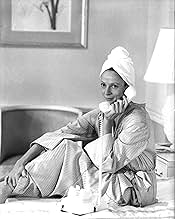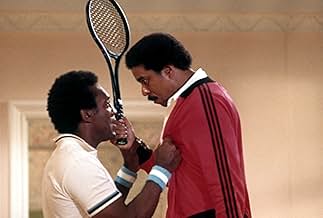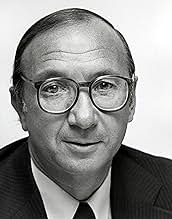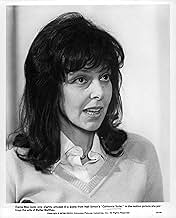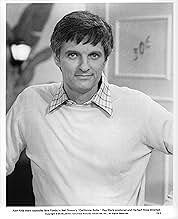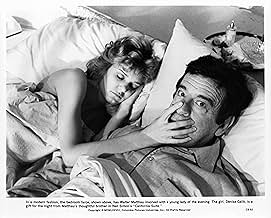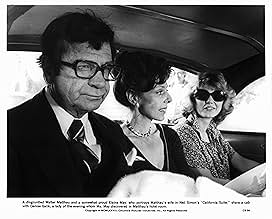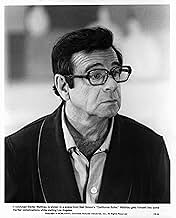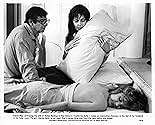NOTE IMDb
6,2/10
8,5 k
MA NOTE
Ajouter une intrigue dans votre langueMisadventures of four groups of guests at the Beverly Hills Hotel.Misadventures of four groups of guests at the Beverly Hills Hotel.Misadventures of four groups of guests at the Beverly Hills Hotel.
- Réalisation
- Scénario
- Casting principal
- Récompensé par 1 Oscar
- 5 victoires et 10 nominations au total
Herb Edelman
- Harry Michaels
- (as Herbert Edelman)
Jerrold Ziman
- Man on Phone
- (as Jerry Ziman)
Histoire
Le saviez-vous
- AnecdotesDiana Barrie (Dame Maggie Smith) says that she wishes David Niven could accept her award for her because he would be witty and charming. In the play on which the movie is based, the character says "Michael Caine," but it was changed when Caine was cast as her husband.
- GaffesWhen Richard Pryor is on the phone with Bill Cosby during the water leak, his shirt gets wetter with each scene. However, when he gets off the phone, his shirt is completely dry.
- Citations
Hannah Warren: You're worse than a hopeless romantic. You're a hopeful one.
- Crédits fousIn the opening credits, famous 70s artworks of British artist David Hockney are featured. The painting before Elaine May's name is entitled "Portrait of an Artist (Pool with two figures), 1972" and features a swimming pool with the Hollywood hills in the backdrop. The "two figures", both male, one swimming and the other standing over watching have been mysteriously edited out of the picture for some unknown reason.
Commentaire à la une
"California Suite" was written by Neil Simon and, as with most films for which he acted as scriptwriter, it is based on one of his stage plays. The main idea is similar to that in his earlier "Plaza Suite", namely that of following the adventures of different guests staying in the same hotel, in this case in Los Angeles. It is a "portmanteau film" with four separate stories and the hotel providing the one point of contact between them. (An earlier film with a similar premise was "The VIPs", based around several groups of travellers passing through Heathrow Airport).
Hannah, a New Yorker, has flown out to California to meet her former husband Bill and to discuss the future of their teenage daughter. Diana Barrie, a British actress, and her husband Sidney are in town because she has been nominated for the Academy Award for Best Actress. Two doctors from Chicago (with the unlikely names of Dr. Chauncey Gump and Dr. Willis Panama) are on vacation with their wives. And Marvin, a Jewish businessman from Philadelphia, and his wife Millie have come out for their nephew's Bar Mitzvah.
The "Visitors from Chicago" story, by far the weakest of the four, is little more than a not-very-amusing slapstick comedy based around the idea that the four characters, especially the two men, cannot move a hand or a foot without breaking something or injuring themselves. I wondered if the American Medical Association were considering suing Simon for the libellous insinuation that they would grant a licence to practise medicine to two such idiots. The Marvin story is a farce based around Marvin's increasingly desperate attempts to hide from his wife that there is another woman in his hotel room, with whom he spent the previous night. (They were unable to travel together and she flew out a night later to join him). Farce can often be desperately unfunny on screen; the cinema version of "No Sex Please, We're British", for example, gives little hint that it was based on one of the most successful West End stage plays of the seventies. Walter Matthau, however, plays Marvin so well (with good support from Elaine May as his wife) that this segment becomes highly entertaining.
Simon, of course, is from New York and most of his plays are set in his home city, but here he makes a rare foray to the West Coast. As his fellow New Yorker Woody Allen had done in "Annie Hall" the previous year, Simon takes the opportunity for some comments on the culture wars between America's Atlantic and Pacific seaboards. Hannah and Bill can be taken as representing the East and West Coast respectively. She is a driven, sharp-tongued, neurotic and workaholic New Yorker, he is a gentler, more laid-back Californian (although possibly an adopted rather than a native son of the Golden State). Jane Fonda (looking even more stunning at the age of 40 than she had done ten years earlier in "Barbarella", especially when she gets to frolic on the beach in a bikini) and Alan Alda both play their parts to perfection; she in particular gets to deliver some of Simon's most barbed lines, like "I don't have a lifestyle. I have a life." and "You're the sort of person who'd solve the world hunger problem by having them all eat out. Preferably in a good Chinese restaurant!" I could certainly imagine Allen writing lines like that.
The fourth story is a bit more serious. Maggie Smith won the Academy Award for Best Supporting Actress for her performance as Diana, thus going one better than her character, who loses out, and I must say it was well deserved, although she might have faced some stiff competition had Fonda been nominated. (This was the year when Fonda won "Best Actress" for "Coming Home", so I don't suppose she minded too much). This is the most serious of the four stories. Sidney is gay, and he and Diana are in a "lavender marriage", possibly a more daring plot line in 1978 than it would be today. Although they love one another in a non- sexual way, Diana has entered into this arrangement because her image as a happily married woman is good for public relations, but Sidney's indiscreet behaviour, however, has started to put this image at risk. Even though she has had a successful stage career, Diana's failure to win the Oscar is a blow to her rather fragile self-esteem, and despite her curious relationship with Sidney she finds herself relying on him for emotional support. Given his normal screen image as a red-blooded ladies' man, Michael Caine might seem an odd choice to play Sidney, but in fact he is very good.
Simon's plays can vary in quality when transferred to the screen. For example, "Barefoot in the Park" (which also starred Fonda, not nearly as good as she is here) today comes across as horribly mannered and dated. "California Suite", however, is one of the better ones. One of the weaknesses of the portmanteau form is that it does not allow for the depth of plot and character development which is possible in a film based around a single story. It also has its strengths, however, one of which is its ability to combine various moods in a single film. "California Suite" is normally categorised as a comedy, and for three- quarters of the time it is, although the tone of the comedy varies from slapstick to farce to verbal wit. In the fourth story, however, it becomes a more serious character study. It enables director Herbert Ross to demonstrate several contrasting styles of film-making, featuring contrasting styles of acting, without the contrasts ever seeming jarring. 7/10, which would have been higher had the "Visitors from Chicago" story been of similar quality to the others.
Hannah, a New Yorker, has flown out to California to meet her former husband Bill and to discuss the future of their teenage daughter. Diana Barrie, a British actress, and her husband Sidney are in town because she has been nominated for the Academy Award for Best Actress. Two doctors from Chicago (with the unlikely names of Dr. Chauncey Gump and Dr. Willis Panama) are on vacation with their wives. And Marvin, a Jewish businessman from Philadelphia, and his wife Millie have come out for their nephew's Bar Mitzvah.
The "Visitors from Chicago" story, by far the weakest of the four, is little more than a not-very-amusing slapstick comedy based around the idea that the four characters, especially the two men, cannot move a hand or a foot without breaking something or injuring themselves. I wondered if the American Medical Association were considering suing Simon for the libellous insinuation that they would grant a licence to practise medicine to two such idiots. The Marvin story is a farce based around Marvin's increasingly desperate attempts to hide from his wife that there is another woman in his hotel room, with whom he spent the previous night. (They were unable to travel together and she flew out a night later to join him). Farce can often be desperately unfunny on screen; the cinema version of "No Sex Please, We're British", for example, gives little hint that it was based on one of the most successful West End stage plays of the seventies. Walter Matthau, however, plays Marvin so well (with good support from Elaine May as his wife) that this segment becomes highly entertaining.
Simon, of course, is from New York and most of his plays are set in his home city, but here he makes a rare foray to the West Coast. As his fellow New Yorker Woody Allen had done in "Annie Hall" the previous year, Simon takes the opportunity for some comments on the culture wars between America's Atlantic and Pacific seaboards. Hannah and Bill can be taken as representing the East and West Coast respectively. She is a driven, sharp-tongued, neurotic and workaholic New Yorker, he is a gentler, more laid-back Californian (although possibly an adopted rather than a native son of the Golden State). Jane Fonda (looking even more stunning at the age of 40 than she had done ten years earlier in "Barbarella", especially when she gets to frolic on the beach in a bikini) and Alan Alda both play their parts to perfection; she in particular gets to deliver some of Simon's most barbed lines, like "I don't have a lifestyle. I have a life." and "You're the sort of person who'd solve the world hunger problem by having them all eat out. Preferably in a good Chinese restaurant!" I could certainly imagine Allen writing lines like that.
The fourth story is a bit more serious. Maggie Smith won the Academy Award for Best Supporting Actress for her performance as Diana, thus going one better than her character, who loses out, and I must say it was well deserved, although she might have faced some stiff competition had Fonda been nominated. (This was the year when Fonda won "Best Actress" for "Coming Home", so I don't suppose she minded too much). This is the most serious of the four stories. Sidney is gay, and he and Diana are in a "lavender marriage", possibly a more daring plot line in 1978 than it would be today. Although they love one another in a non- sexual way, Diana has entered into this arrangement because her image as a happily married woman is good for public relations, but Sidney's indiscreet behaviour, however, has started to put this image at risk. Even though she has had a successful stage career, Diana's failure to win the Oscar is a blow to her rather fragile self-esteem, and despite her curious relationship with Sidney she finds herself relying on him for emotional support. Given his normal screen image as a red-blooded ladies' man, Michael Caine might seem an odd choice to play Sidney, but in fact he is very good.
Simon's plays can vary in quality when transferred to the screen. For example, "Barefoot in the Park" (which also starred Fonda, not nearly as good as she is here) today comes across as horribly mannered and dated. "California Suite", however, is one of the better ones. One of the weaknesses of the portmanteau form is that it does not allow for the depth of plot and character development which is possible in a film based around a single story. It also has its strengths, however, one of which is its ability to combine various moods in a single film. "California Suite" is normally categorised as a comedy, and for three- quarters of the time it is, although the tone of the comedy varies from slapstick to farce to verbal wit. In the fourth story, however, it becomes a more serious character study. It enables director Herbert Ross to demonstrate several contrasting styles of film-making, featuring contrasting styles of acting, without the contrasts ever seeming jarring. 7/10, which would have been higher had the "Visitors from Chicago" story been of similar quality to the others.
- JamesHitchcock
- 30 avr. 2015
- Permalien
Meilleurs choix
Connectez-vous pour évaluer et suivre la liste de favoris afin de recevoir des recommandations personnalisées
- How long is California Suite?Alimenté par Alexa
Détails
- Date de sortie
- Pays d’origine
- Site officiel
- Langue
- Aussi connu sous le nom de
- California Suite
- Lieux de tournage
- 21932 Pacific Coast Highway, Malibu, Californie, États-Unis(24932 Pacific Coast Highway, Malibu, California)
- Sociétés de production
- Voir plus de crédits d'entreprise sur IMDbPro
Box-office
- Montant brut aux États-Unis et au Canada
- 29 000 000 $US
Contribuer à cette page
Suggérer une modification ou ajouter du contenu manquant


